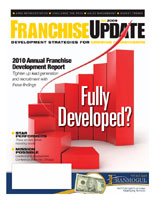There Is Accounting for Franchisees!
Franchisor guidance should improve system-wide results
One of the most helpful services franchisors can provide to their franchisees is accounting direction and services. I am often astonished at how little guidance so many franchisors provide in this area. How will franchisees know if they are truly making money and operating effectively if they don't keep good books and receive information to help them run their businesses more effectively?
The fault here does not lie solely with the franchisors. Historically, and even today, many franchisees have been cautious about allowing franchisors inside the tent of their financial records. It is often said, in jest, that franchisees keep three sets of books: one for themselves, one for their franchisors, and one for the IRS. I am not sure whether this is perceived as the exception or the rule (I expect the former) but I do think it is true that franchisees like to deduct as much as they can from their operating revenues.
Assuming franchisees are not skimming, I have always found franchisee reluctance to provide franchisors with their financial information intriguing. Sometimes they may be worried about the franchisor stealing their accounts in systems where they or another franchisee directly compete. In other cases, where the franchisee is not performing well, it may be a sense of embarrassment. Yet, how can you expect the doctor to help fix the problem without knowing where the patient hurts?
Regardless of franchisees' resistance to any intrusion into their financial affairs by their franchisor, a stronger emphasis on accounting matters can result in a healthier franchise system--and can be a good marketing tool in the franchise sales process. Some practical thoughts about this subject:
- The accounting system must be dependable, easy to use, and affordable. Constant complaints I hear are that it is difficult to teach the accounting and related operating system to the franchisees, and that the system is constantly malfunctioning. I can't comment on how easy or hard it is to create a good accounting system and implement a software program that is user-friendly, as I am technically not qualified to do so. Nevertheless, there should be a plethora of good off-the-rack systems capable of being customized to fit a franchise system's idiosyncrasies. It is the duty (although not necessarily in the legal sense of the word) of the franchisor to locate these.
If the franchisor has company-owned operations, it should make sure within its own house that the system works effectively. If the franchisor has only franchised units, it should ensure that the system is thoroughly tested in some of these operations before system-wide rollout. Franchisee endorsement can go a long way in easing the pain and resistance when implementing a new accounting system. And, of course, let's not forget that the system must have a price tag that is affordable and, in the case of proprietary accounting systems, competitive to what might be available in the marketplace. - The accounting system must produce useful financial reports. These reports can proactively assist franchisees in improving their financial performance. The reports should provide not only operating results from the franchisee's recent activities, but also a comparison with prior periods. The information provided by the accounting system should conform in preparation and presentation to GAAP; or, if there are deviations, explain why they are appropriate to the business. For example, many franchisee financial statements are prepared on a cash, rather than accrual, basis. For franchisees, this tends to overstate income, which gives an impression of better performance than may truly be case. When it comes time to modernize the physical facilities, the franchisee frequently has no funds to do so because no accruals have been made to plan for this inevitable event.
- The accounting system should provide information comparing each franchisee's performance with those of the other franchisees in the system. This should give the franchisees, especially the weaker ones, clues as to where they need to be improving their operations. Are their labor costs too high? Are they paying too much for operations? Are they not generating their fair share of revenues from a particular market segment?
- The franchisor must have the necessary legal tools to implement good accounting throughout the system. These might include:
- The right to require the franchisee to use the appropriate hardware and software. This is already pretty standard in franchisee agreements.
- The right to approve the franchisee's accountant. This may seem Big Brotherish, but all too often the franchisee's accountant simply is not very good.
- A requirement that franchisees use the franchisor for their bookkeeping and accounting needs. One of the more successful franchise systems I work with handles all of the accounting and bookkeeping for its franchisees (other than the data input). This assures that the proper form of reports will be generated, and that these reports will be timely. Alternatively, the franchisees may be required to use a designated accountant (or one from a list of qualified ones). This should lead not only to higher quality accounting, but also to cost savings since the vendor can be promised volume.
- Enforcement of reporting requirements. Franchisors that do not prepare the reports should establish a culture that reports must be provided as required by the franchisor.
One final point: educate. Make sure the franchisees understand the importance of good accounting records and what they may learn from the required reports. Better knowledge of the business will likely lead to better results. Allocation of scare resources by the franchisor to the accounting functions may not be inexpensive, but if properly managed can result in a win-win situation for franchisors and franchisees alike. And that is the essence of what is expected in a franchise relationship.
Rupert Barkoff is a partner in the Atlanta office of Kilpatrick Stockton LLP, where he chairs his firm's Franchise Practice Team. He is a past chair of the American Bar Association's Forum on Franchising, current chair of the Georgia State Bar Association's Franchise Section, and co-editor-in-chief of Fundamentals of Franchising.
Share this Feature
Recommended Reading:
Comments:
comments powered by DisqusFRANCHISE TOPICS
- Multi-Unit Franchising
- Get Started in Franchising
- Growth
- Operations
- Open New Units
- Leadership
- Marketing
- Technology
- Legal
- Awards
- Rankings
- Trends
- Featured Franchise Stories
FEATURED IN

Franchise Update Magazine: Issue 4, 2009






 The franchise listed above are not related to or endorsed by Franchise Update or Franchise Update Media Group. We are not engaged in, supporting, or endorsing any specific franchise, business opportunity, company or individual. No statement in this site is to be construed as a recommendation. We encourage prospective franchise buyers to perform extensive due diligence when considering a franchise opportunity.
The franchise listed above are not related to or endorsed by Franchise Update or Franchise Update Media Group. We are not engaged in, supporting, or endorsing any specific franchise, business opportunity, company or individual. No statement in this site is to be construed as a recommendation. We encourage prospective franchise buyers to perform extensive due diligence when considering a franchise opportunity.